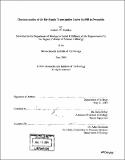Characterization of the Ets-family transcription factor Ets98B in Drosophila
Author(s)
Parlikar, Beth E. W. (Beth Ellen Williams), 1978-
DownloadFull printable version (2.252Mb)
Other Contributors
Massachusetts Institute of Technology. Dept. of Biology.
Advisor
Ilaria Rebay.
Terms of use
Metadata
Show full item recordAbstract
The Ets family of transcription factors is conserved throughout metazoans and plays key roles in normal development and oncogenesis. Prostate-Derived Ets Factor (PDEF), a recently identified family member in humans, is expressed in a subset of normal epithelial tissues in adults. Its expression appears to be altered in many prostate and breast cancers, but its basic biology and normal role in development remain uncharacterized. Ets98B appears to be the Drosophila homolog of PDEF. Ets98B is highly homologous to PDEF in its conserved domains and was found to be expressed in similar tissue types. In order to begin to elucidate the functional characteristics of Ets98B, the phenotypes caused by RNA interference of the Ets98B message were analyzed. These phenotypes, as well as expression patterns, point to a role for Ets98B in wing development. Transcription assays in cultured cells suggest that Ets98B can function as a transcriptional activator. In the future it will be interesting to further explore the phenotypes associated with loss and overexpression of Ets98B and explore the possibility of connections to signaling pathways. In order to further explore the protein's transcriptional control properties, it may be worthwhile to use chromatin immunoprecipitation to identify target genes, as well as perform structure-function analysis to map the transactivation domain(s).
Description
Thesis (S.M.)--Massachusetts Institute of Technology, Dept. of Biology, 2004. Includes bibliographical references (leaves 20-21).
Date issued
2004Department
Massachusetts Institute of Technology. Department of BiologyPublisher
Massachusetts Institute of Technology
Keywords
Biology.